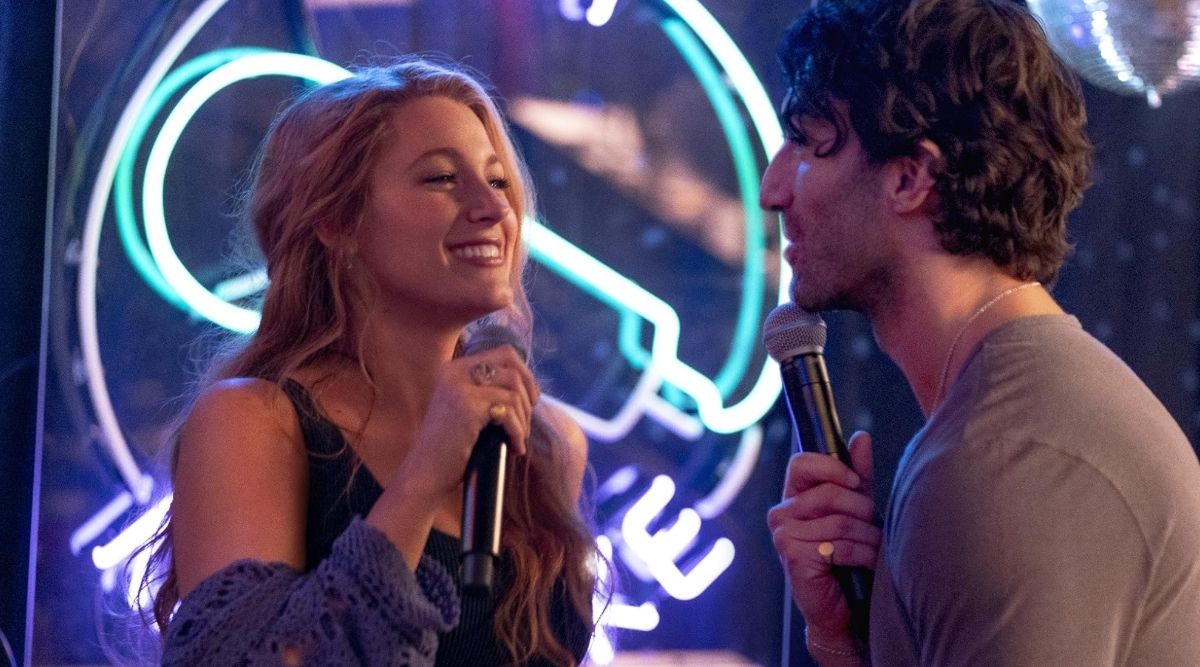Blake Lively stars in the Justin Baldoni and Christy Hall written adaptation of Colleen Hoover’s novel, It Ends With Us. Speaking from personal experience, this may not be an easy movie to watch if you’ve experienced abuse or intimate partner violence. It’s a story about Lily (Blake Lively) meeting Ryle (Justin Baldoni) shortly after she storms out of her father’s funeral. He comes onto her hard, but she tells him she’s a relationship type of person. They part ways.
Until Lily opens her new flower shop and Allysa (Jenny Slate), her best friend-to-be, waltzes in. fWho do we quickly find out just so happens to be Allysa’s brother, of course? Ryle. Their relationship heats up slowly over the first third of It Ends With Us until it reaches a turning point. On the one hand, Blake Lively is a master of bantering. She has the audience wrapped around her finger with every utterance. When she’s flirting with Ryle, she throws in a look or a quip so sharply you can feel its edges. When she’s blabbing with Alyssa, she’s so charmingly awkward.
But there’s also some dreadfully oblique and often unnecessary exposition shoveled into the dialogue. The movie has a crystal-clear visual and sonic language. Everything about Lily’s past and future is telegraphed with body language or musical cues. There’s not much reason to squeeze explanations into the dialogue when the same point is being made so starkly on its own. Some of the movie’s bigger moments get ruined by incredibly corny dialogue, which is only jarring because so much of the rest of the script is on point.

Baldoni plays his part excellently. You can’t help but be charmed by him from the first moment he puts undue pressure on Lily. Her reaction is always so sweet that you can hardly tell whether you’re supposed to be uncomfortable with him or in love with him. Or, at least, I couldn’t tell.
From the first moment Ryle showed up onscreen, he made me uncomfortable. The movie is trying desperately—and successfully—to convince the audience to immediately fall in love with him. It Ends With Us doesn’t even introduce its apparent romantic rival Atlas (Brandon Sklenar) until well into the bloated runtime, just so that there’s nobody else to compete for Ryle’s affection. But his pushiness and the visual and audio cues make it clear quickly that he won’t treat Lily well. It becomes even more evident that he’s going to take dark turns as we learn about Lily’s parents.
The problem with It Ends With Us as a concept isn’t that it asks audiences to empathize with an abuser. The problem is that it asks us to forgive him without him earning it. It’s one thing for Lily to feel how she feels. If we’re supposed to love Ryle and go through the painful experience of learning he’s abusive, learning about his traumatic past is not tantamount to forgiveness.

Forgiveness—which is not a right he has to pursue, but a privilege he has the opportunity to enjoy—should only come after reparations. Ryle pays no reparations in this movie. Yet, the audience is asked to forgive him. The movie thinks it’s leaving Ryle unforgiven based on how it ends. But those are just consequences for his actions. The movie doesn’t give you the choice of feeling bad for him or forgetting about him completely. It Ends With Us clearly wants you to feel bad, and that is not a fair position to put the audience in after watching him.
There’s plenty that It Ends With Us does well. Lively and Baldoni act their socks off despite a fine performance from Slate and forgettable entries from Sklenar and Hasan Minhaj as Allysa’s husband, Marshall. As a movie filled with warning signs about abusive partners and a mostly positive representation of how to escape intimate partner violence (although there is plenty of room for improvement on basically everybody’s part), all I can hope is that some of its lessons rub off onto audience members who need it.
But as a survivor, It Ends With Us offers nothing but stress without an ounce of catharsis. A few of the scenes between Lily and Atlas had me choking up, and I’m not sure that’s a good thing. The conclusion, while not horrendous, did not leave me feeling particularly good about the experience as a whole.
It Ends With Us is in theaters everywhere August 9, 2024.
It Ends With Us
-
Rating - 5/105/10
TL;DR
As a survivor, It Ends With Us offered nothing but stress without an ounce of catharsis.







